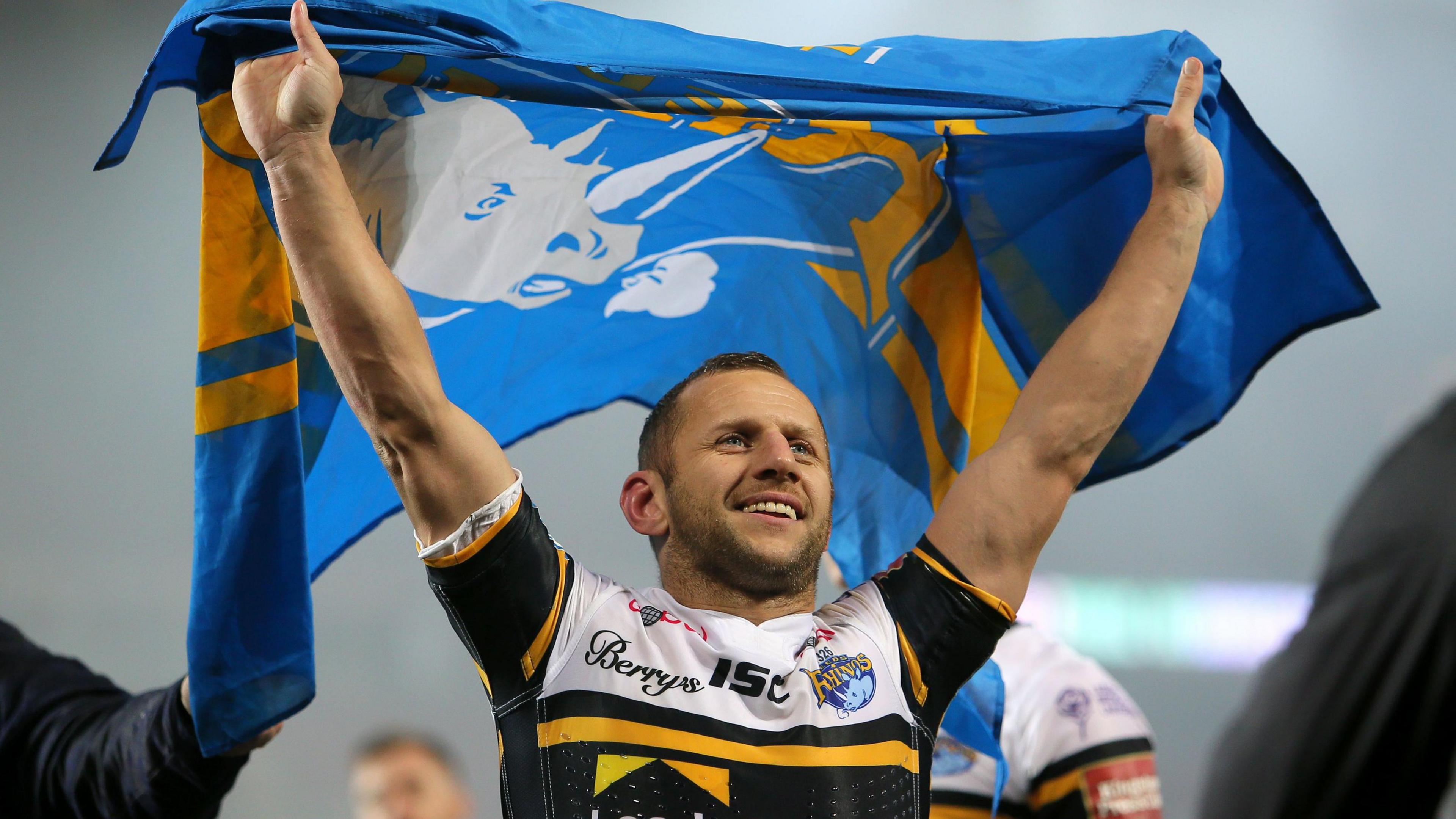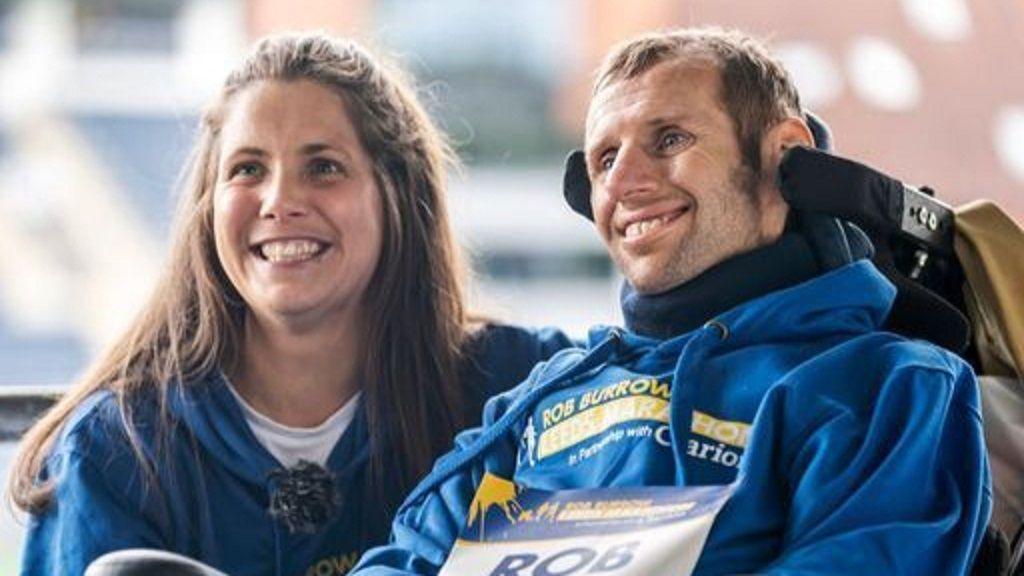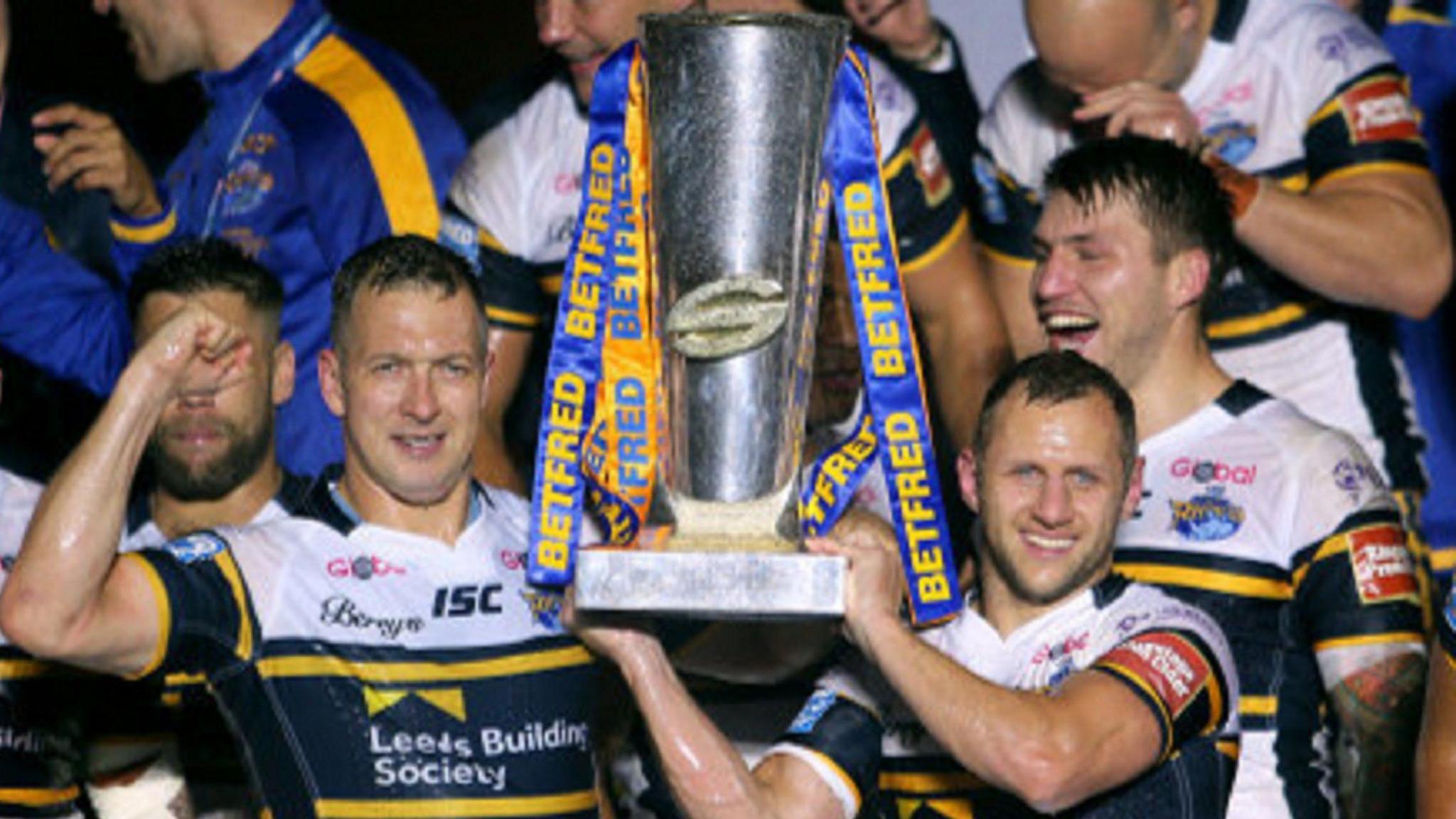Rugby league legend Burrow dies aged 41

Burrow won eight Super League titles with Leeds Rhinos
- Published
Leeds Rhinos and Great Britain rugby league great Rob Burrow has died.
Burrow, who was 41, had lived with motor neurone disease (MND) since being diagnosed in late 2019.
The diagnosis came just two years after he retired from playing, following a stellar 17-year career that included winning eight Super League Grand Finals, three World Club Challenges and two Challenge Cups.
Burrow's death was announced by the Rhinos, who called their former scrum-half and hooker "a true inspiration throughout his life whether that was on the rugby league field or during his battle with MND".
The Prince of Wales said Burrow would be remembered as a "legend" with "a huge heart".
In 2022, Burrow was presented with the Helen Rollason Award at the BBC's Sports Personality of the Year ceremony, with his ex-Leeds team-mate Kevin Sinfield also recognised.
Burrow was given the award for relentless fundraising and raising awareness of MND while battling the illness himself.
Burrow spent his entire club career with Leeds and made more than 400 appearances between 2001 and 2017.
Burrow honoured with Helen Rollason Award while Sinfield accepts special award
One of the most successful rugby league players in history, Burrow was made an MBE in the 2021 New Year Honours for his services to the sport and for his work in the MND community.
Burrow and his great friend Sinfield were both made CBEs in the 2024 New Year Honours. The pair have helped to raise more than £15m for MND charities since Burrow's diagnosis.
Burrow struck a defiant tone on learning he had MND.
"The worst thing for me is people pitying me," he said. "I know it's going to come, but I want to be as normal as ever.
"While I am able-bodied and feel fit and strong and healthy, I want to do normal things and not be treated any differently."
Burrow and wife Lindsey, who married in 2006, had children Jackson, Maya and Macy together.
In announcing his death on Sunday, Leeds said of Burrow: "He never allowed others to define what he could achieve and believed in his own ability to do more.
"The outpouring of love and support that Rob and the whole Burrow family have received over the last four and a half years meant so much to Rob.
"In particular, the rugby league family and MND community have rallied around Rob to inspire him, thank you for your support.
"For those who knew Rob throughout his life, his determination and spirit in the face of MND over the last four and a half years came as no surprise.
"Rob never accepted that he couldn't do something. He just found his way of doing it better than anyone else.
"He will continue to inspire us all every day. In a world full of adversity. We must dare to dream."
Burrow a sporting great and inspirational MND campaigner
- Published2 June 2024
'Beacon of hope' - Sinfield's tribute to friend Burrow
- Published3 June 2024
Tributes paid to Rob Burrow following death at 41
- Attribution
- Published3 June 2024
Burrow scores sensational try against St Helens
In February, it was announced that the player of the match award at this year's Super League Grand Final will be renamed after Burrow, the first player to win the trophy twice, in 2007 and 2011.
Tributes flooded in from the rugby league world, with Super League leaders St Helens calling Burrow "a hero in every sense of the word" and Wigan Warriors saying that "his legacy will live on through those whose lives he touched, and his story will continue to inspire all".
A tribute to Burrow from the Rugby Football League said: "Since December 2019, his courage and humanity - allied to that of his family, friends and former Leeds Rhinos team-mates, led by Kevin Sinfield CBE - has transcended sport."
The Prince of Wales, who presented the CBE to Burrow and Sinfield at Headingley in a January visit this year, paid tribute on X.
The prince wrote: "A legend of Rugby League, Rob Burrow had a huge heart. He taught us, 'in a world full of adversity, we must dare to dream.' Catherine and I send our love to Lindsey, Jackson, Maya and Macy."
The MND Association, for whom Burrow became a patron in 2021, said it was "incredibly grateful to Rob and his family for helping to raise awareness of MND, and funds for the association, by sharing the details of their journey and by inspiring so many people both within the MND community and the wider public".
"In doing so much, he inspired support from so many," the charity added.
"It is testament to the strength of feeling people have for Rob that the support in his name has never wavered."
Rob Burrow carried over marathon finish by Kevin Sinfield
Burrow used diagnosis to shed light on MND
Burrow, his family and his long-term friend Sinfield used various means to tell their story and help raise awareness of Burrow’s condition.
In 2022, they contributed to a BBC documentary called Rob Burrow: Living with MND, about love, family, friendships and the reality of living with the condition.
Former team-mate Sinfield, who Burrow met when he was 12, has completed several endurance challenges which have raised a total of more than £7m and been featured in two BBC documentaries.
Burrow began using an eye-controlled computer which put words into a version of his voice to allow him to communicate. Using that machine, he read the CBeebies Bedtime Story on the International Day of Persons with Disabilities in 2022.
He also put questions to other sporting legends for an award-winning BBC podcast in 2023 called 'Rob Burrow Seven, Meets...', featuring the likes of Wayne Rooney, Jonny Wilkinson and Mike and Zara Tindall.
Earlier this year, Burrow and Sinfield contributed to a picture book which told the story of a friendship between two young boys named Rob and Kev, and Burrow's widow Lindsey has already written a memoir which is due to be published in 2025.

Burrow's wife Lindsey was a constant support throughout his fundraising
'Burrow conquered rugby league'
Matt Newsum, BBC rugby league correspondent
For such a diminutive figure, the loss of Rob Burrow casts a big shadow over rugby league - a sport he loved, conquered and championed throughout his life.
From a kid in ill-fitting padding to his highest peaks as a decorated member of the Leeds Rhinos 'golden generation', Rob defied both standard thinking and adversity to become a world-class player.
What was to some a disadvantage - his small stature - he turned into a positive. His tackle technique made him an axe-like cutter in defence, while his speed off the mark and devastating footwork left the big boys pawing at thin air as he left them in his wake. Think a sporting 'Roadrunner' and you're on the right track.
He was also brave as a player - another factor that helped him deal with his later diagnosis - and the sight of him standing up to Hull's huge forward Epalahame Lauaki remains an image many fans will recall fondly.
Burrow achieved all the success and all the glory without changing his personality. I can recall times waiting around in the bowels of Headingley after a rare Leeds loss; he would never refuse the interview, however glum the expression.
He was selfless as a player and this continued in his coaching role as he helped mould the Rhinos stars of tomorrow before his MND diagnosis forced him to step aside.
The wider public came to know what rugby league fans already knew as he challenged his disease with his defiance, shining a beacon on the condition and capturing hearts and minds with his character and spirit.
Rob Burrow was no ordinary rugby league player and certainly no ordinary human being. He was the best of both.

Rob Burrow lifted the Grand Final trophy for the final time with Leeds Rhinos in 2017 following a 24-6 win over Castleford
Rob Burrow receives a 'Points of Light' award from Rishi Sunak